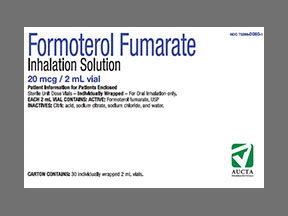
Formoterol Coupons & Savings Card – Discount Prices from $8.21
Generic for: Perforomist
Formoterol, marketed as Perforomist, is prescribed for managing symptoms of chronic obstructive pulmonary disease (COPD) over an extended period. It functions by relaxing the muscles in the airways, thereby facilitating easier breathing. As a long-acting beta-agonist (LABA), Formoterol requires the use of a nebulizer machine for administration. This medication is designed to improve long-term respiratory health in individuals with COPD, enhancing their quality of life. Always consult healthcare professionals before starting or changing any medication regimen.
Our coupons are free to use. Before paying, show the pharmacist your Formoterol savings card to get your free discount. Use our filters below to edit the prescription box to match your needs. The Formoterol prices will update based on your prescription needs. Above our Formoterol coupons, you can change your location to see pharmacy prices and costs in other areas. We're here to help you buy Formoterol at the lowest price with our prescription discount card.
My prescription
Edit
30 nebulization solutions 2ML of 20MCG/2ML, Formoterol (1 Box)
Select pharmacy

CVS
$19.92
COUPON PRICE
Walgreens
$8.21
COUPON PRICE
Albertsons
$10.20
COUPON PRICE
Walmart
$12.46
COUPON PRICEFormoterol savings card
Show this card to your pharmacist
Walgreens
$8.21
BIN
ID
PCN
GRP
011867
LH92EBD53B
HT
LABH001
Powered by
Formoterol, marketed as Perforomist, is prescribed for managing symptoms of chronic obstructive pulmonary disease (COPD) over an extended period. It functions by relaxing the muscles in the airways, thereby facilitating easier breathing. As a long-acting beta-agonist (LABA), Formoterol requires the use of a nebulizer machine for administration. This medication is designed to improve long-term respiratory health in individuals with COPD, enhancing their quality of life. Always consult healthcare professionals before starting or changing any medication regimen.
Our coupons are free to use. Before paying, show the pharmacist your Formoterol savings card to get your free discount. Use our filters below to edit the prescription box to match your needs. The Formoterol prices will update based on your prescription needs. Above our Formoterol coupons, you can change your location to see pharmacy prices and costs in other areas. We're here to help you buy Formoterol at the lowest price with our prescription discount card.
More prescriptions for copd
coupons from$10.39Save 69%
coupons from$361.20Save 34%
coupons from$42.64Save 91%
coupons from$51.84Save 90%
coupons from$34723.98Save 73%
coupons from$216.71Save 87%
coupons from$51.84Save 90%
coupons from$1.45Save 97%
More prescriptions for copd
Arformoterol Save 69%coupons from $10.39
Spiriva Handihaler Save 34%coupons from $361.20
Terbutaline Save 91%coupons from $42.64
Xopenex Hfa Save 90%coupons from $51.84
N-acetyl-l-cysteine Save 73%coupons from $34723.98
Symbicort Save 87%coupons from $216.71
Xopenex Hfa Save 90%coupons from $51.84
Acetylcysteine Save 97%coupons from $1.45
Formoterol dosage forms
Use our Formoterol 2ML of 20MCG/2ML coupon with prices from $12.46 for 1 Box. You can also use our Formoterol 2ML of 20MCG/2ML coupon with prices from $18.08 for 2 Boxes. We have a Formoterol 2ML of 20MCG/2ML coupon with prices from $22.62 for 3 Boxes.
Dosage Quantity Price from Per unit 2ML of 20MCG/2ML 1 Box $12.46 $12.46 2ML of 20MCG/2ML 2 Boxes $18.08 $9.04 2ML of 20MCG/2ML 3 Boxes $22.62 $7.54
| Dosage | Quantity | Price from | Per unit |
|---|---|---|---|
| 2ML of 20MCG/2ML | 1 Box | $12.46 | $12.46 |
| 2ML of 20MCG/2ML | 2 Boxes | $18.08 | $9.04 |
| 2ML of 20MCG/2ML | 3 Boxes | $22.62 | $7.54 |
